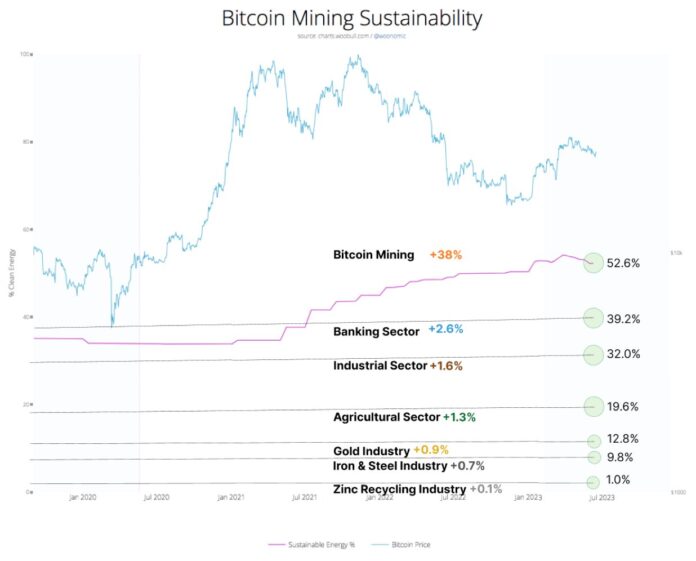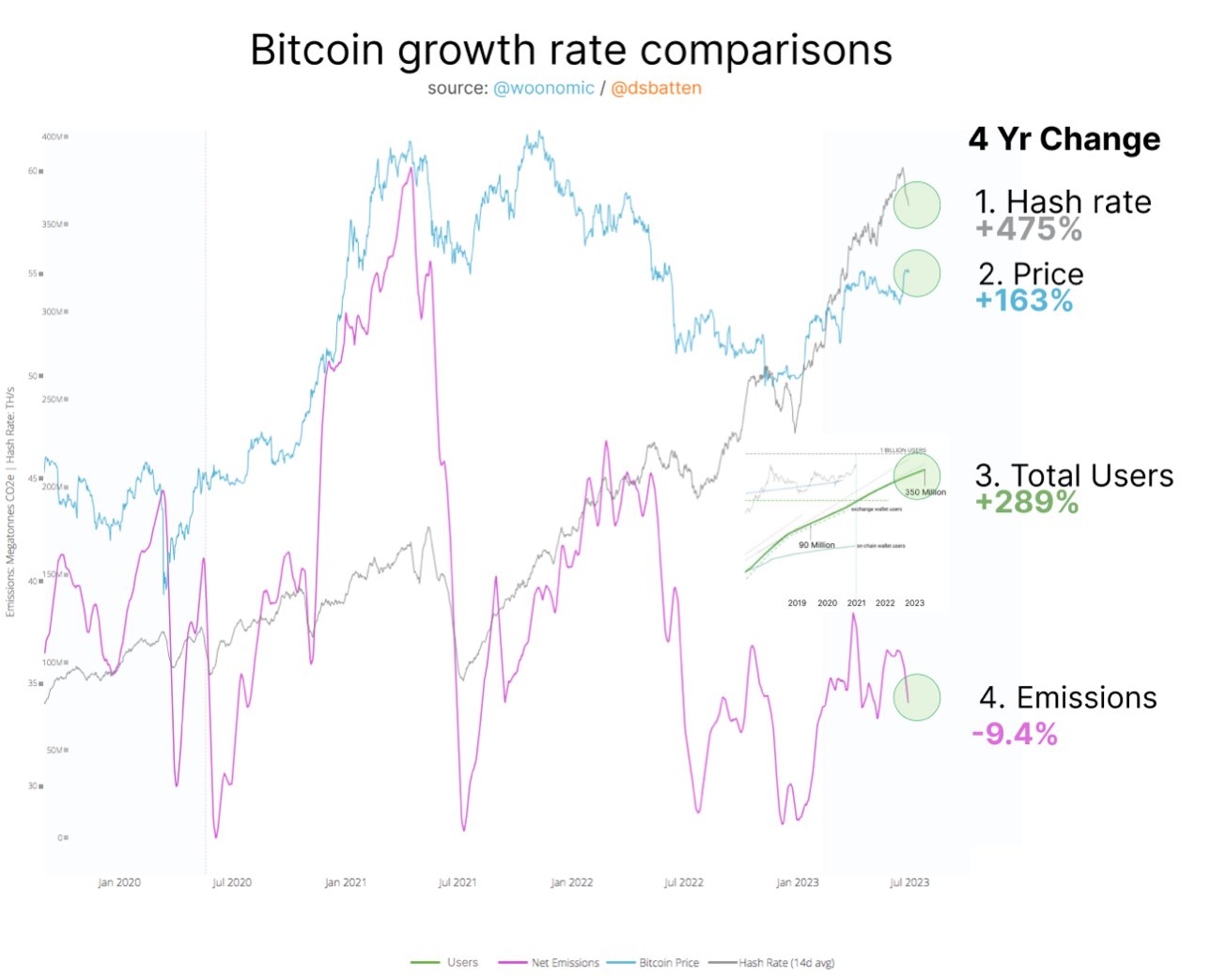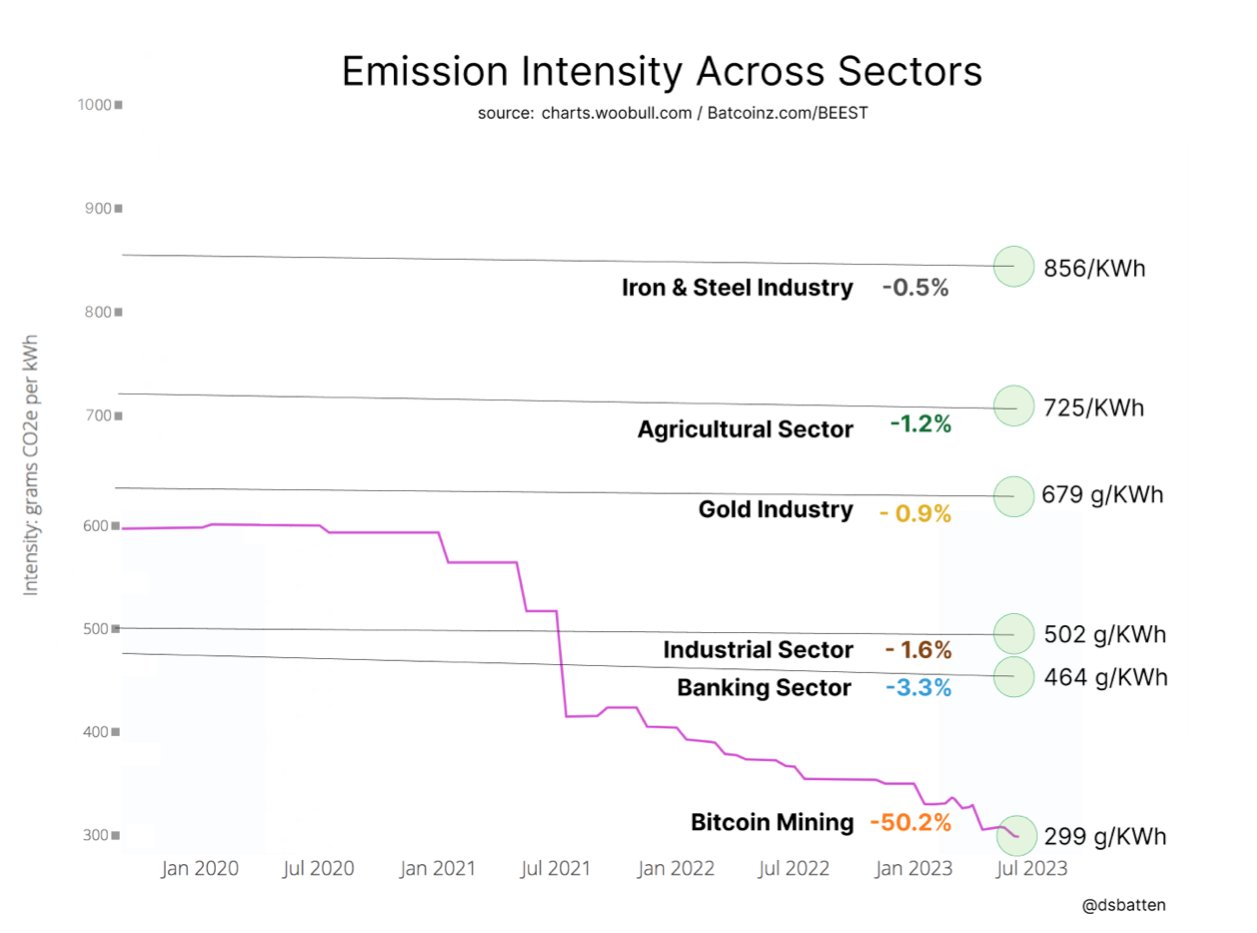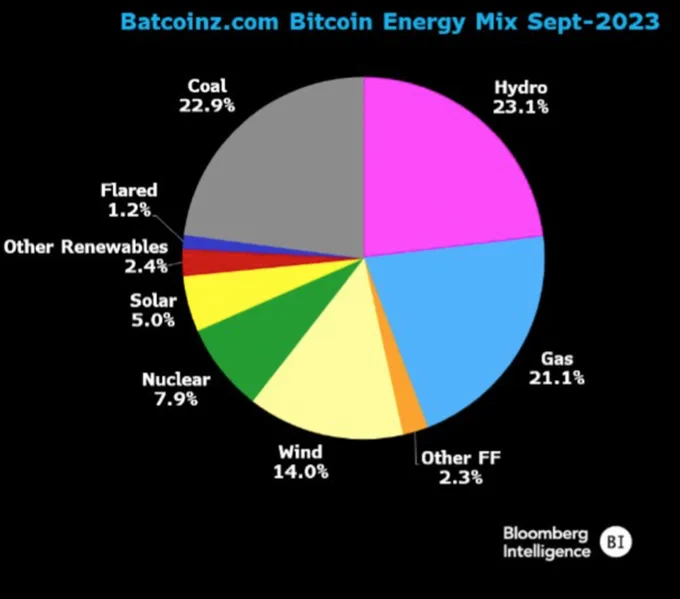Data shows that the Bitcoin mining sector has become the most sustainably-powered global industry, as more than 50% of it uses clean energy.
Majority Of Bitcoin Mining Industry Uses Clean Energy Sources
One of the main criticisms against BTC is that the sector uses a considerable amount of energy and, thus, releases a notable amount of emissions.
Things appear to be developing for the better and quite fast. In a new post on X, the co-founder of CH4Capital, Daniel Batten, has shared a few charts that look into the sustainability of the BTC network and how it compares with other sectors.
The first chart displays the trend in the percentage of sustainable energy used by Bitcoin mining and other industries over the last four years.
The trend in the clean energy used by the various global industries | Source: @DSBatten on X
As shown in the above chart, most industries have seen minimal growth in using sustainable energy during this period. The Banking Sector, the second largest in terms of clean energy usage, saw a rise of 2.6%.
On the other hand, the Bitcoin mining sector has observed an increase of a whopping 38%, which has taken the share of sustainable energy powering the blockchain to 52.6%. This growth has naturally made BTC mining the most sustainable among these global industries.
An even more interesting chart is this one that compares the emissions of the network (in terms of megatons of CO2 emitted) with the various indicators related to the blockchain’s growth.
Looks like emissions on the network have gone down in this period | Source: @DSBatten on X
Three Bitcoin metrics are being considered here: the mining hashrate, the price, and the total number of users. The first has grown by 475% during the past four years, the second by 164%, and the third by 289%.
Despite these growths, however, the emissions of the mining sector have gone down almost 10% in the same period. Batten notes that even if you double these metrics during any four-year cycle, the emissions will be the same as at the start, which no other industry has achieved.
The fact that the hashrate, which is a measure of the total amount of computing power that miners have connected to the blockchain, has been able to rise while total emissions go down would imply that the emission intensity (that is, the emissions per kWh of power used) has declined.
Indeed, as the data would confirm, the BTC network’s emission intensity has dropped by more than 50% in the last four years, making the mining sector the most emission-efficient among the global industries.
All other industries have only seen a slight decrease in this metric | Source: @DSBatten on X
Finally, Batten has also shared the energy composition of the network, noting that the largest power source is hydro.
23.1% of the network is powered by hydro energy | Source: @DSBatten on X
This means that the Bitcoin mining sector is also the only one that doesn’t have its largest source of power coal.
BTC Price
Bitcoin has been stagnant for a while now, and the asset is only continuing this sideways trend as its price trades around the $26,100 level.
BTC is still stuck in its consolidation | Source: BTCUSD on TradingView
Featured image from Brian Wangenheim on Unsplash.com, chart from TradingView.com
Credit: Source link

























 Bitcoin
Bitcoin  Ethereum
Ethereum  XRP
XRP  Tether
Tether  Solana
Solana  USDC
USDC  Dogecoin
Dogecoin  Cardano
Cardano  Lido Staked Ether
Lido Staked Ether  TRON
TRON  Wrapped Bitcoin
Wrapped Bitcoin  Wrapped stETH
Wrapped stETH  Chainlink
Chainlink  Avalanche
Avalanche  Sui
Sui  Stellar
Stellar  Litecoin
Litecoin  Toncoin
Toncoin  Shiba Inu
Shiba Inu  Hedera
Hedera  LEO Token
LEO Token  USDS
USDS  Hyperliquid
Hyperliquid  Polkadot
Polkadot  WETH
WETH  MANTRA
MANTRA  Bitcoin Cash
Bitcoin Cash  Bitget Token
Bitget Token  Ethena USDe
Ethena USDe  Wrapped eETH
Wrapped eETH  Uniswap
Uniswap  Monero
Monero  NEAR Protocol
NEAR Protocol  Pepe
Pepe  WhiteBIT Coin
WhiteBIT Coin  Aave
Aave  Ondo
Ondo  Bittensor
Bittensor  Aptos
Aptos  Internet Computer
Internet Computer  Dai
Dai  Official Trump
Official Trump  Mantle
Mantle  Ethereum Classic
Ethereum Classic  Tokenize Xchange
Tokenize Xchange  OKB
OKB  Gate
Gate  sUSDS
sUSDS  Coinbase Wrapped BTC
Coinbase Wrapped BTC 
